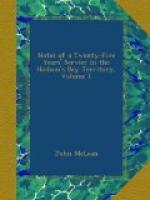[Footnote 1: “Quidam parentes et propinquos, priusquam annis et macie conficiantur, velut hostias caedunt, eorumque visceribus epulantur.” The Nascopies do not feast on the “viscera” of their victims, nor do I believe the inhabitants of India, or of any other country under heaven, ever did. Yet the coincidence is singular, in other respects, at such a distance of time and place.]
The Nascopies depend principally on the rein-deer for subsistence,—a dependence which the erratic habits of these animals render extremely precarious. Should they happen to miss the deer on their passage through the country in autumn, they experience the most grievous inconvenience, and often privations, the succeeding winter; as they must then draw their living from the lakes, with unremitting toil,—boring the ice, which is sometimes from eight to nine feet thick, for the purpose of setting their hooks, and perhaps not taking a single fish after a day’s hard work. Nevertheless, they must still continue their exertions till they succeed, shifting their hooks from one part of the lake to another, until every spot is searched. They understand the art of setting nets under the ice perfectly. Towards the latter end of December, however, the fish gain the deep water, and remain still to the latter end of March. Not a fish enters the net during this period.
Partridges are very numerous in certain localities, but cannot be trusted to as a means of living, as every part of the country affords them food, and when much annoyed at one place they move off to another.
It will be seen from the foregoing remarks, that the Nascopies, like all other erratic tribes, are subject to the vicissitudes their mode of life necessarily involves; at one time wallowing in abundance, at another dying of want. Fortunately for themselves, they are at present the most independent of the whites of any other Indians on this continent, the Esquimaux excepted. The few fur-bearing animals their barren country affords are so highly prized, that the least exertion enables them to procure their very limited wants; and the skin of the rein-deer affords them the most comfortable clothing they could possess. They have a particular art, too, of dressing this skin, so as to render it as soft and pliable as chamois, in which state it becomes a valuable article of trade.
As trading posts, however, are now established on their lands, I doubt not but artificial wants will, in time, be created, that may become as indispensable to their comfort as their present real wants. All the arts of the trader are exercised to produce such a result, and those arts never fail of ultimate success. Even during the last two years of my management, the demand for certain articles of European manufacture had greatly increased.




